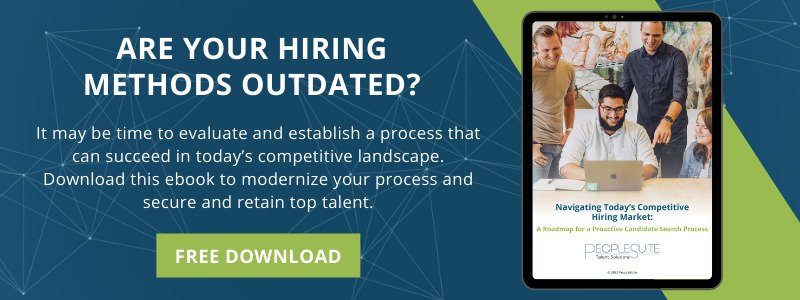When a job opening needs to be filled, you are tasked with finding the top talent and getting them on board. A bad interview can drive away a good fit or bring on a bad fit for your company. The success of your company will largely depend on being able to bring in great people who want to join your team. Your interview should be designed as a good experience for the candidate, while efficiently uncovering as much as possible about how the candidate might fit into the open position and company culture.
Challenges of Interviewing
Most companies get stuck asking the most generic questions, like “where do you see yourself in five years” or “what is your biggest weakness.” These questions get canned responses because the candidate has already thought about them. You need to ask the questions that uncover gems about the candidate’s personality, motivations, values, and work ethic.
But, more importantly, you need to break out of your own box.
One of the hardest things to get hiring managers to do is consider people who are very different from themselves, people with a different approach or perspective. The natural default is to hire people like yourself. But people you want to hang out with or can identify with aren’t necessarily the right people for the job. More often than not, this natural tendency to hire people like you leads to a lack of diversity in thought, skin color, background, and perspective.
If you recognize this natural bias to hire people like the ones already in the office, you will open yourself up to a wide range of possibilities. Instead of hiring another Chris from marketing or Lindsay from sales, you’ll start to branch out and gain a wealth of perspectives. Instead of creating a company echo chamber, you’ll choose people who challenge assumptions and bring fresh ideas to the table.
The Interviewee’s Experience
Your primary responsibility during the interview is to gain the trust of the candidate. Without trust, you won’t be able to open up the conversation and gain any real insight.
Interview preparation is a huge part of attracting high-quality talent. A good candidate is going to have options and choose the company that offers the best fit and most impressive approach to the hiring process. Your process should set your company above other competing companies.
The candidate’s experience during the interview process is critical!
- Be timely! Never make candidates wait.
- Keep your phone out of the room. Apologizing to take a call or checking the time on your phone shows you aren’t fully engaged in the process.
- Don’t read the resume for the first time in front of the candidate. Consider marking up/making notes/highlighting the resume with questions you have ahead of time and taking that to the interview. (Shows the candidate your care and attention to detail.) This extra step will impact the candidate, even if he or she is unaware.
- Listen! Take advantage of silence rather than filling dead air and overshadowing the interviewee. You want to give her or her time to think, process, and respond. The candidate’s questions and comments will give you insight, so make sure to give them that opportunity.
Asking the Right Questions
Consider how the question will be answered and what you are trying to learn. We most often use the ‘STAR’ method, which has the applicants respond with: Situation, Task, Action, Result. The more open-ended and unexpected the question, the more the candidate can provide insightful answers that help you get to know him or her better.
Get the Conversation Rolling
There’s one question we highly recommend asking just to kick things off in the right direction:
“What single project or task would you consider your greatest accomplishment to date?”
The answer to this question allows for an organic conversation. Follow up questions could include:
- What were the actual results you achieved?
- Why were you chosen?
- What were the biggest challenges?
- How did you overcome them?
- Describe the resources needed to complete the project?
- Were there mistakes made – if so, what did you learn from them?
- What would you do differently?
Uncover Personal Motivation
After the initial question plays out, you can use these unexpected questions to better understand your candidate’s personal motivation:
“What makes you an ideal match for this particular position?”
“What kinds of tools or education would make you a more productive/effective employee?”
“What was your first job and how did you learn the ropes there?”
“Where does this position fall in your career path?”
Consider Adaptability and Problem-Solving Capabilities
Make sure you ask questions that expose problems the candidate has faced. How they even label or remember the problem can tell you a lot about his or her perspective:
“What has been the most stressful part of your career so far?”
“What is the toughest criticism you’ve received from a boss or client?”
“Think back to a time when you had to explain a complex issue to a frustrated customer. How did you handle it?”
Check Alignment with Company Values
You’ll want to know how the candidate aligns with your company values. Consider what values your company holds that are key to your culture and brand. Build interview questions based on your values.
You don’t want to end up with a homogenous workplace (where everyone holds the same perspective as you), so there may be things that “rub you the wrong way” that aren’t going against your underlying values. A blunt candidate, for example, might strike you as rude, but if you look deeper you would realize they align well with your value for honesty and transparency.
Examples of questions to ask a job applicant that would have underlying company values:
Teamwork: “Tell me about a time when a coworker resisted helping with a project. How did you handle it?”
Customer service: “Was there a time you really needed to impress an important customer or client? What did you do outside of your norm?”
Leadership: “Who was the best boss you ever had? What made him/her such a good fit for you?”
Find the Culture-Fit Candidate
It’s really important to find candidates that fit into your culture and add to your culture.
Culture is important to most of your candidates (88%) and nearly a third are willing to take a pay cut for a job that comes with a positive and aligned company culture, according to a study done by Jobvite.
Again, don’t confuse a company culture fit with candidates that reflect the personalities and perspectives you already have on board.
Your company culture shouldn’t be dependent on the same personalities and perspectives—it should be much deeper. You want an employee who will appreciate the important aspects of your company culture and bring his or her own spin to the table, broadening your company’s collective knowledge and experience. To understand one’s ability to “play nice” and fit into your company culture, you might ask questions like:
“Have you ever accidentally upset or offended someone? Was the situation ever resolved?”
“Did you ever have to work with someone with a different personality or work ethic than your own? How did it impact your own work?”
“Was there ever a time a boss or coworker should have listened to you and didn’t? What was the outcome?”
Work on Team Alignment
As you’re preparing to conduct an interview, internal alignment is key. You need to choose a singular aggregator or leader of the process—someone the candidate knows to reach out to during the process. But, you don’t have to keep a singular interviewer to handle the whole process. It works best in most companies to break up responsibilities.
- Make a strategic plan around the interview process
- Don’t ask the same questions (this will seem unorganized and time-wasting)
Break Up the Work
Choose the best interviewers to cover various parts of the interview. You can break up the work to ease the burden from a singular person and get more perspectives on the candidate. For example:
- Interviewer 1: Culture fit
- Interviewer 2: Experience or proficiencies
- Interviewer 3: Job expectations and company sales pitch
Debrief and Confer
Following the interview, hold a session or a process for all interviewers to debrief. Everyone involved should come together to compare notes and opinions. This is the crucial point of your interview process where you determine if the talent is the right fit. Involving key management is the best way to get multiple perspectives on how the talent might fit into the culture and perform on the job.
After a hire is made, you should examine your process effectiveness and adjust your interview approach moving forward. Don’t settle until you feel the process is highly efficient and effective at bringing in top talent. You need to be able to identify great people for the job and also win them over to take the offer.
Are you about to start a talent search? PeopleSuite can help you attract top talent and find the best person for the job. Contact us today to find out how you can challenge the norm and improve your hiring process or book a free consultation to discuss how PeopleSuite can make the difference in your hiring strategy.










